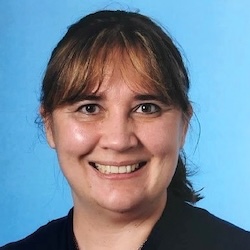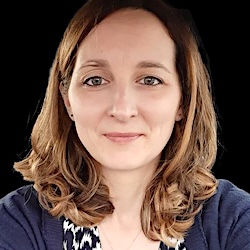 Lizana Oberholzer is an Executive and Leadership Coach as well as a Senior Lecturer in Teacher Education (specialising in teaching and learning, assessment, SEND, curriculum design, school improvement, English, Media Studies, Leadership Development, and Coaching Psychology) and Postgraduate provision. She is the programme lead for the University of Wolverhampton’s International MA in Education, as well as the Early Careers Framework and National Professional Qualifications for School Leadership where she also leads on the coaching of Senior Leaders, Headteachers and Executive Leaders in Education. Lizana works closely with executive leaders across disciplines to strategically lead and support their teams to unlock their potential. She is passionate about coaching psychology, leadership development, inclusion, governance and teacher development. Lizana supports the BELMAS Research Interest Group for Governing and Governance as a Convenor. She is also a BELMAS Vice Chair and Trustee as well as a BAMEed Trustee. Lizana works with WomenEd as a regional lead in the West Midlands. She is currently the IPDA England Chair, as well as Chair of the IPDA International Committee. She chairs the UCET’s CPD forum and is a member of the UCET Executive Committee. Lizana is a member of the APPG for the Teaching Profession, and Chairs the APPG SIG for Teacher Development for the APPG for the Teaching Profession. She is a proud trustee of a Multi Academy Trust, and is a committed educator, striving to provide learners with learning opportunities and life-chances. Lizana is actively involved in the British Psychological Society’s Division of Coaching, and she is the Chair for the division. Lizana is a Founding Fellow of the Chartered College of Teaching, an IPDA Fellow as well as a CMI Fellow. Her research interests centre around professional learning, mentoring, coaching and leadership development within education, and other disciplines.
Lizana Oberholzer is an Executive and Leadership Coach as well as a Senior Lecturer in Teacher Education (specialising in teaching and learning, assessment, SEND, curriculum design, school improvement, English, Media Studies, Leadership Development, and Coaching Psychology) and Postgraduate provision. She is the programme lead for the University of Wolverhampton’s International MA in Education, as well as the Early Careers Framework and National Professional Qualifications for School Leadership where she also leads on the coaching of Senior Leaders, Headteachers and Executive Leaders in Education. Lizana works closely with executive leaders across disciplines to strategically lead and support their teams to unlock their potential. She is passionate about coaching psychology, leadership development, inclusion, governance and teacher development. Lizana supports the BELMAS Research Interest Group for Governing and Governance as a Convenor. She is also a BELMAS Vice Chair and Trustee as well as a BAMEed Trustee. Lizana works with WomenEd as a regional lead in the West Midlands. She is currently the IPDA England Chair, as well as Chair of the IPDA International Committee. She chairs the UCET’s CPD forum and is a member of the UCET Executive Committee. Lizana is a member of the APPG for the Teaching Profession, and Chairs the APPG SIG for Teacher Development for the APPG for the Teaching Profession. She is a proud trustee of a Multi Academy Trust, and is a committed educator, striving to provide learners with learning opportunities and life-chances. Lizana is actively involved in the British Psychological Society’s Division of Coaching, and she is the Chair for the division. Lizana is a Founding Fellow of the Chartered College of Teaching, an IPDA Fellow as well as a CMI Fellow. Her research interests centre around professional learning, mentoring, coaching and leadership development within education, and other disciplines.
 Dr Sean Starr is one of three University Apprenticeship Leads. He oversees a multidisciplinary team of academics and professional services staff at the faculty level, driving the development and delivery of Leadership, Business, and Law Apprenticeships. His role emphasizes fostering excellence in teaching, learning, and professional development for our diverse student base.
Dr Sean Starr is one of three University Apprenticeship Leads. He oversees a multidisciplinary team of academics and professional services staff at the faculty level, driving the development and delivery of Leadership, Business, and Law Apprenticeships. His role emphasizes fostering excellence in teaching, learning, and professional development for our diverse student base.
In addition, he co-leads the Management Research Centre, where he focuses on impactful knowledge exchange initiatives. He aims to advance innovation and create measurable value for organisations and society by bridging the gap between academic research and practical application. He co-leads the Corporate Governance and Sustainability cluster as part of the centre. A multidisciplinary hub dedicated to advancing the understanding and practice of responsible governance and sustainability in diverse organizational contexts. Rooted in principles of leadership development and innovative research
As the Director of Executive Education, he leads diverse teams to design and deliver bespoke learning and development programmes tailored to the needs of local, regional, national, and international organizations. He focuses on cultivating strategic partnerships, enhancing organizational performance, and empowering professionals to thrive in a rapidly evolving global landscape.
 Gurpinder is Professor in Education for Social Justice and Inclusion in the School of Education. He has an international track record of delivering funded research projects focused on social justice and inequity in education. In terms of research approaches, ethnography and educational linguistics have been utilised. He is advisor to the National School Food Review working group, School Meals Coalition and working within the network of the World Food Programme for school feeding. His work was cited in the UNESCO Education Global Monitoring report, 'Education and nutrition: Learn to eat well' Currently, serves as the England representative for the UNESCO Global Health Education secretariat. He is Co-Director and founding member of the Centre for Research in Education and Social Transformation (CREST) and the research hub lead for Education, Leadership and Social Justice. He is module lead for Critical Approaches to Diversity, Equality and Social Justice in Education (7ED002, MA Education) and teaches on the Doctoral programme. He has led doctoral students to completion and is currently supporting students as Director of Studies. Gurpinder holds Principal Fellowship of the Higher Education Academy (PFHEA).
Gurpinder is Professor in Education for Social Justice and Inclusion in the School of Education. He has an international track record of delivering funded research projects focused on social justice and inequity in education. In terms of research approaches, ethnography and educational linguistics have been utilised. He is advisor to the National School Food Review working group, School Meals Coalition and working within the network of the World Food Programme for school feeding. His work was cited in the UNESCO Education Global Monitoring report, 'Education and nutrition: Learn to eat well' Currently, serves as the England representative for the UNESCO Global Health Education secretariat. He is Co-Director and founding member of the Centre for Research in Education and Social Transformation (CREST) and the research hub lead for Education, Leadership and Social Justice. He is module lead for Critical Approaches to Diversity, Equality and Social Justice in Education (7ED002, MA Education) and teaches on the Doctoral programme. He has led doctoral students to completion and is currently supporting students as Director of Studies. Gurpinder holds Principal Fellowship of the Higher Education Academy (PFHEA).
Gurpinder is an award winning researcher and has authored 5 books. These include Schools, Food and Social Learning (Routledge, 2019), School Farms: Feeding and educating children (Routledge, 2021), Schools, Space and Culinary Capital (Routledge, 2022) and Food Futures in Education and Society (Routledge, 2023). He co-led a 5th book titled, Food, Culture & Society in India (exp. October 2025) and now co-leading Critical Food Studies from the Global South. He is also co-writing a research monograph titled 'The School Meals Service - Past, Present and Future' with research papers in progress. He has been appointed as a member of the ESRC peer-review college (2024-present).
Gurpinder is book series editor for Food and Cultures from the Global South (Peter Lang Publishing). He has published in leading Education journals and serves on a number of leading education and sociology editorial boards which include: British Journal of Sociology of Education, Cambridge Journal of Education, International Studies in Sociology of Education and British Journal of Educational Studies. He is a member of the executive committee for the Society for Educational Studies (SES, 2022-present) and an elected member of the BERA council (2023-present). He is Visiting Professor of Education in the Centre for Teacher Education and Research (CTER) at Beijing Normal University, Visiting Associate Professor of Education in the Department of Education at Xi'an Jiaotong-Liverpool University and Visiting Senior Research Fellow in the Faculty of Educational Sciences at the University of Helsinki.
His research has been funded by the ESRC, British Council, NIHR Special schools and school meals, NIHR Place-based health inequality, World Food Programme, BERA, BAICE, Independent Social Research Foundation, Society for Educational Studies, UKPRP, Birmingham Childrens Project, Birmingham City Council, Wolverhampton City Council Early Researcher Award Scheme. He is co-investigator on the first detailed historical and ethnographic study of the UK School Meals Service with a particular focus on the lived cross-generational experience of those receiving and preparing school meals. Funded by the UKRI Economic and Social Research Council (ESRC), the study is titled 'The School Meals Service - Past, Present and Future' (Grant no: ES/X000737/1, 2023-2025) and awarded £1 million.
Gurpinder's work has received media coverage and across key Think Tanks which include UK Parliament POST, School Food Matters, International Food Tank, The Conversation, Express and Star, Education Business, Department for Education, Times Education Supplement, School Food Matters, Teaching Times and more recently on school breakfast provision from the British Medical Journal (BMJ).
 Reader in Digital Learning Contexts and the Research Hub Lead for Digital and Lifelong Learning Contexts at the Centre for Research in Education and Social Transformation (CREST), Matt is also the Coordinator for the UNESCO Chair on Innovative Informal Digital Learning in Disadvantaged and Development Contexts.
Reader in Digital Learning Contexts and the Research Hub Lead for Digital and Lifelong Learning Contexts at the Centre for Research in Education and Social Transformation (CREST), Matt is also the Coordinator for the UNESCO Chair on Innovative Informal Digital Learning in Disadvantaged and Development Contexts.
Matt is also a Senior Lecturer in Primary Teacher Education and the Lead Tutor for BA(Hons) Year 3 Primary ITE students at the University of Wolverhampton, having relinquished the role of Pathway Leader for Primary English in 2021. He was interim Head of Primary Education between December 2021 and June 2022. He leads on undergraduate Research modules on the primary teaching course leading to Qualified Teacher Status (QTS), and also teaches on the Masters in Education and doctoral programmes. He has been nominated by students for a Vice Chancellor's Award for Staff Excellence in the 'Enriching the Learning Experience' and 'Student Engagement' categories eight times in the past four years.
A Senior Fellow of the Higher Education Academy, Matt’s doctoral thesis focused on the epistemological and pedagogical trajectories of PGCE trainees within the field of Primary English. Matt’s research interests have previously focused on personalising the learning journey for children and students, but he is now predominantly working on mobile and digital learning, particularly in the Globalised South; digital literacy; the use of social media for public health benefits; and school children as leaders of public health movements. He recently co-authored a report for the Department for International Development's EdTech Hub on lessons learned to support governments' digital responses to the educational crisis brought on by the COVID-19 pandemic. With John Traxler, Matt has co-edited "Digital Learning in Higher Education - COVID-19 and Beyond", charting the effects of the pandemic on digital learning across the Higher Education sector, and with John others edited a Special Issue (now a book) on Decolonising Educational Technology.
Matt has been involved in research in Palestine focusing on developing mobile technologies for supporting the teaching of English; in Wolverhampton focusing on mental health and resilience in young people; in Brazil, supporting school populations to influence virus control through mobile applications; and was Principal Investigator on an Erasmus+ project with partners across Europe creating a new online collaborative approach to textbook work. He is currently the Coordinator for the University's UNESCO Chair, and is working with international colleagues to support communities in disadvantaged and developmental contexts, and - with another UNESCO Arm - to support the incorporation of intercultural dialogue into the five key dimensions of the EU's DigComp framework in order to strengthen their potential as tools to build and sustain peace.
Prior to becoming a Senior Lecturer, Matt worked as a primary teacher, English specialist and Assistant Headteacher. He is keen for children to take ownership of their learning, and to work with teachers to develop a facilitative, learner-centric method that favours exploration and social construction of learning over more traditional, didactic teaching styles.
Matt teaches two modules on the Masters in Education programme, and supervises both Masters and Doctoral thesis students. He currently has seven PhD and EdD students, and is very proud of his first completing student, who successfully defended her viva in June 2020.
 I have a PhD in Technology Enhanced Learning (2017), which explored the challenges and opportunities in the introduction of a social network to support community learning of re-sit GCSE students in an FE colleges.
I have a PhD in Technology Enhanced Learning (2017), which explored the challenges and opportunities in the introduction of a social network to support community learning of re-sit GCSE students in an FE colleges.
I have been involved in projects, including participation as teacher and organiser of a British Council Newton Utafiti funded workshop in Nairobi, Kenya that explored innovative methodologies for research that utilise digital and mobile technologies to support community learning and knowledge exchange in agricultural communities.
I worked integrally on an Erasmus+ project that supports the development of teachers skills and pedagogical knowledge in language teaching in Palestinian HEIs. As part of this I have organised workshops on the use of learning technologies and pedagogical knowledge for innovative and transformative, student-centred teaching and learning practice and published widely.
I am currently involved in an EU funded project exploring the development of Co-created Interactive Courseware (CiC) through a new platform (Nextbook) designed by software developers, which involves multiple stakeholders from across Europe to support Open Educational Resources.
Bio coming soon.

 Kumar Jayantilal is a Senior Lecturer in Education at University College Birmingham. He worked as a qualified primary school teacher for almost ten years, with areas of expertise in coaching and mentoring, Early Years, behaviour management, and curriculum, specialising in physical education (PE). His research interests include (primary) PE, occupational socialisation, and contemporary school cultures. Currently, he is pursuing a Professional Doctorate in Education (EdD), where his thesis investigates the influence of neoliberal performativity on primary teachers' work in PE. Optional: Away from work, he is a long-distance runner, enjoys listening to music, and an avid Arsenal supporter.
Kumar Jayantilal is a Senior Lecturer in Education at University College Birmingham. He worked as a qualified primary school teacher for almost ten years, with areas of expertise in coaching and mentoring, Early Years, behaviour management, and curriculum, specialising in physical education (PE). His research interests include (primary) PE, occupational socialisation, and contemporary school cultures. Currently, he is pursuing a Professional Doctorate in Education (EdD), where his thesis investigates the influence of neoliberal performativity on primary teachers' work in PE. Optional: Away from work, he is a long-distance runner, enjoys listening to music, and an avid Arsenal supporter.
 Derek Boyle has been the SCITT Director at Bromley Schools' Collegiate since 2013 and prior to that he was a physics teacher for 12 years and Assistant Headteacher for 5 years. He holds an MA in Leadership in Education and is currently studying for a PhD with the University of Wolverhampton researching building stronger partnerships in School-Centred Initial Teacher Training partnerships.
Derek Boyle has been the SCITT Director at Bromley Schools' Collegiate since 2013 and prior to that he was a physics teacher for 12 years and Assistant Headteacher for 5 years. He holds an MA in Leadership in Education and is currently studying for a PhD with the University of Wolverhampton researching building stronger partnerships in School-Centred Initial Teacher Training partnerships.
Derek holds a Senior Fellowship of CollectivEd, Senior Fellowship of the Higher Education Academy and is a Fellow of the Chartered College of Teaching.
He is an active member of the IPDA as a member of the International Committee and also the conference committee.
His research interests centre on the professional learning and development of School-Based Teacher Educators and placement mentors.


/prod01/wlvacuk/media/departments/digital-content-and-communications/images-2024/Architecture-students-tree-planting.png)
/prod01/wlvacuk/media/departments/digital-content-and-communications/images-2024/250630-SciFest-1-group-photo-resized-800x450.png)
/prod01/wlvacuk/media/departments/digital-content-and-communications/images-2024/Andy-Lane-WLV.jpg)
/prod01/wlvacuk/media/departments/digital-content-and-communications/images-2024/Arthi-Arunasalam-teaser.jpg)
/prod01/wlvacuk/media/departments/digital-content-and-communications/submitted-news-images/Children-screening.jpg)
/prod01/wlvacuk/media/departments/digital-content-and-communications/submitted-news-images/GIC-Block-A-Visual-2----Entrance.jpg)